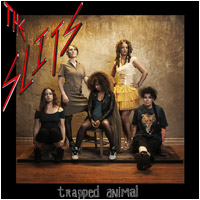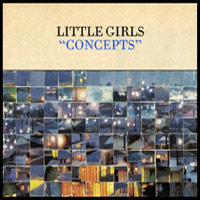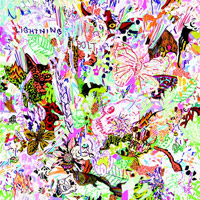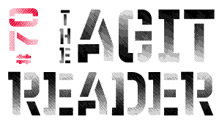
Logos
Kranky
Bradford Cox is giving Spencer Krug a run for his money as the busiest guy in rock music. Over the past 20 months, Cox has released four full-lengths between his band Deerhunter and his solo project Atlas Sound, along with a litany of EPs. Like his 2008 debut as Atlas Sound, Logos is another collection of songs that splits the difference between ’60s radio pop and sonic experimentation. But this time around, Cox gets a couple huge assists from Animal Collective’s Noah Lennox and Stereolab’s Laetitia Sadler, which helps to temper Cox’s casual morbidity with a shot of druggy sunshine. Like all Cox releases, the detachment and nonchalance of the performances creates a false sense of chemical euphoria that tends to overstay its welcome. Luckily, the album’s highlights rank among Cox’s best work yet.
The Noah Lennox track, “Walkabout” is a strong candidate for song of the year alongside “My Girls,” the masterpiece he helped write for Animal Collective. Lennox wraps one of his seemingly effortless yet instantly timeless melodies around the wide-eyed line “What did you want to see? What did you want to be when you grew up?“ Underneath the breezy vocals, Cox juggles shards of processed organ, a bouncing bassline, hand-claps, tambourine and a strong current of machine fuzz, sounding like a band from 2050 covering a Zombies song. The next track, “Criminals,” is one of Cox’s patented prom dance waltzes from hell, And after nearly a whole album of relatively laidback songs, the toe-tapping closer “Logos” finally gives him and the listener the chance to rock out a little bit.
To be a prolific songwriter is a two-way street. On one hand, Cox’s lack of self-editing means that he still doesn’t have an album under his belt that is great from start to finish. On the other hand, he’s released half a dozen albums over his career which are all filled with individual breathtaking moments. And while more than a few songs on Logos sound like well-trod territory for Cox, great things happen whenever he’s willing to stretch his ambition and his imagination to new lengths.
David Holmes

Trapped Animal
Narnack
It’s been almost three decades since the Slits released their last studio album, 1981’s Return of the Giant Slits, which is a bit of time, especially by music industry standards. Yet, here they are, almost 30 years and numerous line-up changes later, with a new album. So what is the rationale behind a band that has achieved a sort of feminist cult status coming together after such a long time? A burst of creativity? A longing to express meaningful and revolutionary ideas? Unfortunately, with Trapped Animal, neither of those thoughts hold true.
The Slits formed during a time when the London punk scene’s arms were wide open for new influences, and the Slits’ love for the avant-garde made them a perfect fit. They became famous for experimenting with a strange mixture of punk and reggae. But during the time between 1981 and now, much has changed. Trapped Animal marks a valiant effort to show that many things, like the issues of feminism and abuse that inspired the music, have remained unaffected by time. Similarly, the Slits’ defiant blend of dub-punk and raucous vocals has remained untouched. This album, though, is a bit heavy on the dub and thin on creativity.
The Slits attempt to remain controversial and relevant by tackling the aforementioned issues: abuse (“Issues”) and rejection (the creatively titled “Reject”). Then again, the Slits never were, and still aren’t, a fan of subtlety. The album leads off with the anything-but-understated feminist anthem, “Ask Ma,” which leans heavily on cliches and simplistic lyricism. “Babylon” is a reggae anthem that would even make the ghost of Bob Marley proud, and “Reject,” though not the most lyrically stimulating, is an enjoyable, lively tune, evoking those angst-riddled teenage years while simultaneously poking fun at them.
Trapped Animal’s downfall isn’t necessarily its content, but after such a long hiatus, the album feels slightly contrived, as though there’s some ulterior motive of which we’re not privy, but should nonetheless remain skeptical.
Jennifer Farmer

Concepts
Paper Bag
Like close contemporaries Blank Dogs, Toronto’s Little Girls spare the histrionics in creating the buzzing, darkened sounds found on their debut long-player, Concepts. Made in the mold of Seventeen Seconds, only with blurred fidelity replacing that album’s stark contrasts, the album may leave listeners cold, but that’s kind of the point. The Girls keep the mood chilly throughout the record’s 11 tracks, which turn out to be affecting as much for their austerity as for as the melodies under the icy surface.
Like Blank Dogs, Little Girls was originally the recording project of one man, Josh McIntyre, who also shares Mike Sniper’s affinity for anonymity, keeping his face hidden in press photos. And though he’s fleshed the Girls out into a full band, Concepts still seems the product of one mind: mechanized drum beats matched to thumbed bass notes and a bevy of effects-laden guitar layers. Lead-off cut “Youth Tunes” is borne from some black lagoon, a three-chord refrain meshing with ghostly yowls in a perfect fit of synchronicity. That simple feat of cohesion is all one gets before the cuts erodes into a two-note frenzy, but the rest of the album picks up similarly, “Tambourine” and “Salt Swimmers” answering the banshee call. But more than just tricks and treats, Concepts shows McIntyre developing his voice and creating something that, transcending mere promise, is the sound of post-punk’s reawakened ghosts living in the now.
Stephen Slaybaugh

Tarot Sport
ATP
If the Fuck Buttons’ last record, Street Horrrsing, was rough sex for noise lovers, then Tarot Sport is the tantric fantasy version. It’s smoother and prettier and it won’t jerk you around so much, but it leaves you at least as exhausted.
Unfortunately, long-time fans won’t be able to avoid noticing that Tarot Sport all too often feels like Street Horrrsing: the Special Edition. The first single, “Surf Solar,” is just “Bright Tomorrow” but three minutes longer and with updated special FX. “Rough Steez” equals “Ribs Out” with synths. Let’s take a moment to clarify: this is still mind-altering music, it’s just a bit disappointing that more of isn’t new music. The similarities aren’t just in feeling and tempo. Chord progressions, long notes and underlying rhythms are repeated so closely, I really do wonder if they were trying to remake portions of certain songs. “Lisbon Maru,” while bordering on gently caressing the ears, a first for Fuck Buttons, could be called “Sweet Love for Planet Earth: Chopped ’n’ Screwed.”
Thankfully, the last three tracks really deliver. “Phantom Limb” is short, beguiling, and totally unique. Then, “Space Mountain” and “Flight of the Feathered Serpent” combine like Voltron to form a single, bludgeoning 18-minute climax for the album. Really, the first track’s goal is just to take you higher, but the finale has the out-and-out balls to go from screeching noise to epic melody to a drum attack like a motorcycle engine and back to epic noise before dropping you off a cliff with only a prolonged synth shriek to guide you. Good luck finding your way back from that.
Matt Slaybaugh

CrownsDown
Anticon
Anticon is a label based in the Bay Area whose bands are notorious for their avant-garde hip-hop and usage of distortion. And as its reputation seems to precede itself, when another artist from the Anticon collective releases an album, it takes a lot to surprise. Unfortunately, the long-awaited new release from Anticon darlings Themselves, CrownsDown, does little to push the already trite envelope that they originally helped to create.
Themselves consists of the DJ/MC duo of Jeffrey “Jel” Logan and Adam “Doseone” Drucker, who is also a co-owner of the Anticon label. Together, they’ve been making music since 1998, and though they’ve enjoyed critical success as part of other creative endeavors, playing alongside fellow Anticon-ers as Subtle and with members of the Notwist as 13 & God, they’re well respected for putting their hip-hop sensibilities to productive use as Themselves. The duo has an uncanny ability to distill an array of influences to their most carnal form, though on CrownsDown the output happens to be something more akin to noise than music, as beguiling as that noise may be. The outcome is strange and intriguing fuzzy hip-hop, but noise just the same.
Themselves utilize samples, distortion and reverb like no other hip-hop group out there (except, of course, for the others on the Anticon label), but CrownsDown is just another addition to this repertoire. Themselves seem confused about how much influence they’d like to have in the world of hip-hop, or if they even want to be a part of that world at all. This album, as with previous releases, makes a concerted effort to steer clear of cliched rap fodder, leaning, instead, on intelligence, though with all the commotion, that’s sometimes hard to discern. The lyrics are certainly more discernible than other efforts (see Subtle), but the message gets lost somewhere in the distortion. CrownsDown builds a wall between Themselves and us, as if they’re unwilling to cut hip-hop novices any slack. Collectively, Themselves’ sound borrows more from These Are Powers or Aphex Twin than the Furious Five, but any wisdom that could be imparted is lost entirely in translation—either you’re hip enough to get it, or you’re not. And after a thorough dosage of CrownsDown, I’m content to remain passe.
Jennifer Farmer
MP3: “You Ain’t It”

Earthly Delights
Load
So far, most reviews of Earthly Delights harp on 2005’s Hypermagic Mountain, a somewhat forgettable redundancy in the Lightning Bolt oeuvre. By then, the manic grooves first forged by the duo were wearing thin. You’d have to go back to the Oops tour, shared with like-minded tumult and blitzkrieg terrorists Othrelm, Arab on Radar and the Locust, to find the last time Lightning Bolt were relevant. More than any other time in their existence, the band was larger than life, every live show a religious experience. It was almost inconceivable that a band operating with such primitive means expressed such a monolithic presence and possessed such transcendental powers. I suppose you don’t know what you got till it’s gone, and by staying dormant through the lo-fi revolution, Lightning Bolt have regenerated with Earthly Delights, while their former peers either ran out of gimmick or became an underground punchline. Try putting on a Locust record these days without snickering.
As a testament to their past triumphs, in the span since Hypermagic Mountain, Lightning Bolt’s aesthetic has yet to become commonplace. That alone makes this album ahead of the times, even if you’d swear you’ve heard it all before. One has to jump in with little expectations. The Brians, bassist Gibson and drummer Chippendale, aren’t breaking much new ground. There are no stylistic shifts or uncharacteristic jaunts into pop, but somehow they’ve managed to bolster their noise into a fury above and beyond past efforts. Still, there’s plenty of slick scaffolding built around the gargantuan riffs we’ve come to adore. The manic aggression that caps the slow, laborious climb of “Colossus” is enough to indulge in the relentless grind that envelops the entire proceedings. Rarely does Lightning Bolt expand upon their intense, perhaps unintentional, hybridization of grindcore, hardcore, thrash and bone-shattering doom, making tracks like “Funny Farm” and “Nation of Bore” compete with the best moments churned out by the Melvins, the Boredoms or Melt Banana. Occasionally Chippendale will iterate a melody, but you’d have to scrape and drill your way through the rubble to find them. Only on “The Sublime Freak” do they try to gather some psychedelic dust, but it ends up sounding like a blissful, aural illusion. That’s beside the point. Going into Earthly Delights for innovation is fruitless; they’ve already been innovators. Drowning in the chaos, letting one become subservient to the music is key, and that’s likely how it always will be.
Kevin J. Elliott
MP3: “Colossus”
ALBUM REVIEWS
Antipop Consortium, Fluorescent Black
Neon Indian, Psychic Chasms
Bell Horses, This Loves Last Time
Exene Cervenka Somewhere Gone
Thomas Function, In the Valley of Sickness
Volcano Choir, Unmap
The Black Heart Procession, Six
Basement Jaxx, Scars
Lou Barlow, Goodnight Unknown
Mission of Burma, The Sound the Speed the Light
The Drums, Summertime EP
Kris Kristofferson, Closer to the Bone
Ciao My Shining Star: The Songs of Mark Mulcahy
Robin Guthrie, Carousel
